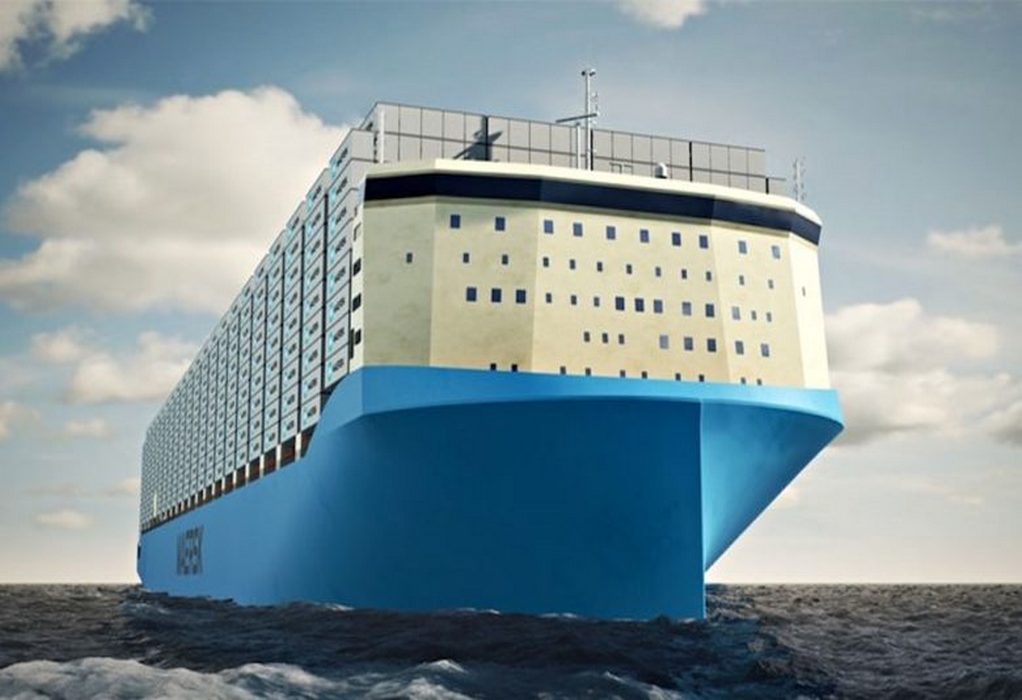The logistics giant Maersk will order eight new ocean-going ships that will use only carbon-neutral fuels to hit its net-zero goal by 2050. While it will be a more expensive endeavor than traditional vessels that run on fossil fuels, it is in line with what its customers want. They include: Amazon, Disney, H&M Group, HP Inc., Levi Strauss & Co., Microsoft, Novo Nordisk, The Procter and Gamble Company, PUMA, Schneider Electric, Signify, Syngenta, and Unilever. More than half of Maersk’s 200 largest customers have set – or are setting – ambitious science-based or zero-carbon targets for their supply chains.
The global shipping industry consumes about 3,050 terawatt-hours of the worldwide final energy — more than five times the total electricity consumption of Germany. And nearly all of that fuel right now is bunker oil. As a result, the shipping sector emits about 1,000 million tons of CO2 per year, equating to 13% of the greenhouse gas emissions from global transport.
The International Maritime Organization has already committed the shipping sector to cut its greenhouse gas emissions in half by 2050, from a 2008 baseline. Those targets will be measured by new logistics approaches, increased efficiency, speed/power reductions, and – as the most effective pathway – the application of sustainable or carbon-neutral fuels for propulsion.
The vessels, built by Hyundai Heavy Industries, come with a dual fuel engine setup that can run methanol and conventional low-sulfur fuel. Clean methanol is produced either from biofuels or green hydrogen — hydrogen produced using wind and solar power.
It’s a timely purchase because Maersk is now tasked with replacing many of its smaller ships reaching the end of their 30-year life. The shipper has a cap-ex budget of $7 billion this year. Each new vessel is estimated to cost $175 million, and they can haul 16,000 containers.
From the onset, Maersk sets out to operate the ships on carbon-neutral e-methanol or bio-fuels. But it will be challenging because methanol production has to be ramped up. For that, Maersk is working with its partners.
“Unilever is committed to accelerating the transition to clean transport solutions, not just in our operations but along global value chains as we work to achieve net-zero emissions by 2039,” says Michelle Gross, head of logistics at Unilever. “With logistics and distribution accounting for around 15% of our greenhouse gas emissions footprint, it’s important that we work with partners shifting to lower-carbon fuels. We are proud to partner with Maersk as they pioneer carbon-neutral transportation on the high seas.”
REintegrate and European Energy will start out producing 10,000 tons of e-methanol out of a new Danish facility for Maersk’s benefit. The methanol facility will use renewable energy and biogenic CO2 to produce e-methanol. The fuel production is expected to start in 2023. Indeed, Maersk is one of the early shippers to use renewable fuel for heavy transportation.
This agreement “brings us on track to deliver on our ambition to have the world’s first container vessel operated on carbon-neutral methanol on the water by 2023,” says Henriette Hallberg Thygesen, CEO of Fleet & Strategic Brands, A.P. Moller – Maersk. It’s a venture that the shipper hopes to replicate.
European Energy, which is building the e-methanol facility, has contracted Siemens Energy to help it with hydrogen-made methanol. Siemens will provide the electrolyzes that create an electric current that splits hydrogen and oxygen from water. A nearby solar facility will create the e-fuel.
In its Hydrogen Economy Outlook, Bloomberg New Energy Finance says that green hydrogen could supply 24% of the world’s energy demands by 2050 while cutting CO2 levels by 34%. But that requires proactive policies and new investments. The American Jobs Act authorizes and appropriates $9.5 billion in this country for clean hydrogen research, development, and demonstration programs. The law includes a $1 billion program to cut the cost of producing hydrogen using electrolyzers.
“Climate change requires urgent action. Together with our partner European Energy we are taking over a first mover’s role in decarbonizing the marine industry. With this project, we will bring e-methanol to market at scale,” says Stefano Innocenz, a senior VP at Siemens Energy.
He adds that e-methanol fuel or the derivatives from e-fuels have a bright future in long-distance shipping, automotive transport, and aviation.
Once Maersk hits the high seas with its new carbon-friendly vessels, it says that its CO2 levels will fall by 1 million tons or 3% — a respectable cut in its current CO2 levels of 33 million tons.
“Sustainability is embedded across our business and remains a core value at HP,” says Antoine Simonnet, chief supply officer. “We recently announced some of the most ambitious climate action goals in our industry, and to achieve them we are implementing more sustainable transportation solutions within our supply chain, including these green fuels collaboration with Maersk. It’s an important step for all companies to make the greatest impact possible and help combat the climate crisis.”
Maersk’s customers are at the center of its new drive. Collectively, they will drive down the cost of these new technologies so that others along the value chain can take advantage of them. It’s an expensive investment that helps the shipper burnish its brand in a competitive market.
Source: https://www.environmentalleader.com/
Tags: Amazon, Carbon, Disney, Fuels, Maersk, Shipping



Recent Posts
Chartered Speed expands its electric mobility footprint in Arunachal Pradesh
PSA International joins Global Centre For Maritime Decarbonisation as a strategic partner
MPA and NYK Group Advance Collaborative Efforts on Maritime Autonomous Surface Ship Trials
BIMCO drafts new clause to support biofuel use in time charters
Global Maritime experts attended India@Nor-Shipping – Maritime Partnership for a shared & sustainable future
India-Norway Dialogue Anchors on Sustainable Maritime Development
Sea cruise ships can now connect to shore power in Amsterdam
Corvus Energy partners with HD Hyundai Mipo for AiP on new green product tanker design.